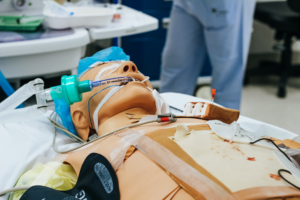
BSN Programs in Georgia
By EveryNurse Staff on June 14, 2021

With a multitude of job opportunities available in hospitals, doctor’s offices, and long-term care facilities, the nursing profession is one of the fastest growing occupations in the United States. An increasing number of healthcare-related employers are seeking registered nurses who have an undergraduate degree. In Georgia, there are more than twenty schools that have a BSN program which qualifies graduates for a wide range of job positions in the field, such as travel nurses, public health professionals, and even case managers for insurance companies.
Schools With BSN Programs in Georgia
- Through the College of Nursing and Health Sciences at Valdosta State University, students may earn their Bachelor of Science in Nursing through the basic pre-licensure program, an accelerated BSN program for second-degree students, or the RN Preference Pathway (an RN-to-BSN program). Students pursuing the traditional four-year BSN program must complete the University Core Curriculum before taking classes at the College of Nursing. Before submitting an application to the accelerated program at the university, students need to finish a minimum of 45 hours in the Core Curriculum, which includes at least 4 of the 5 required sciences. As for the Pathway program, most nurses complete their nursing requirements within one academic year.
- In addition to offering a traditional four-year Bachelor of Science in Nursing curriculum, Kennesaw State University also has an accelerated program for students who have already earned a bachelor’s degree in a different field. The school additionally has an online bridge RN-BSN completion option for registered nurses possessing an associate degree or diploma in nursing. While taking classes through the WellStar School of Nursing, students will encounter a course load that includes classes in humanities, biology, clinical practice, theory, and social sciences.
- There are two ways to earn a Bachelor of Science in Nursing from Albany State University – entering the four-year BSN program or enrolling in the RN-to-BSN program, which is offered to nurses with an associate degree or nursing diploma. One of the requirements for entering the 4-year nursing program at the University is the completion of at least five out of the five required Sciences with no more than one failure regarding the subject matter. Undergraduate nursing courses that students may encounter include Pharmacology; Women’s’ Health Nursing; Pediatrics Nursing; and Nursing Research. The RN-to-BSN program takes two years to complete, and includes courses, such as Leadership; Community Health Nursing; and Health Assessment.
- With more than 90 percent of Columbus State University’s nursing school graduates passing the NCLEX, students either enter the traditional 4-year bachelor program, or qualify for the RN-to-BSN program. Providing small, interactive classes in 7-week blocks, registered nurses can earn a bachelor’s degree in as little as one year while enrolled in the 12-month year-round program offered online. The University’s BSN programs are accredited by the NLNAC.
- Georgia Southern University offers a Bachelor of Science in Nursing program that takes four years to complete. Approved by the Georgia Board of Nursing and accredited by the Commission on Collegiate Nursing Education (CCNE), students will take courses such as Nursing Care of Developing Families, Mental Health Nursing, Health Assessment Across Lifespan, and Community Health Nursing while working towards their degree.
- The two ways a student earns a Bachelor of Science in Nursing degree from Emory University is through the school’s traditional four-year BSN program, or the BSN for Second Degree Students program. Both programs require students to complete prerequisites before applying to the Nell Hodgson Woodruff School of Nursing. The prerequisites for students pursuing the four-year BSN program include 60 semester hours or 90 quarter hours of college course credit, such as General Chemistry, Human Anatomy & Physiology, and Introductory Statistics. The Second Degree program consists of two years of study that combines classroom, lab, and clinical work – students are expected to complete seven specific courses (such as Human Growth and Development or Life Span Development) as a prerequisite.
- Students attending South University, located in Savannah, take classes at the school’s College of Nursing and Public Health when working towards a BSN. Just some of the subjects the CCNE accredited curriculum touches upon includes palliative care, gerontological nursing, and alternative nursing methods. Applicants should know that the nursing program at the school is limited access, and only qualified candidates who have successfully completed all prerequisite courses and fulfilled all admission requirements will be considered.
- Classes for the BSN programs offered at Middle Georgia State College are taken at the School of Health Sciences, which accepts pre-licensure students and RNs looking to earn a bachelor’s degree in their field. Students in the pre-licensure program will encounter the traditional, four-year college curriculum – taking core classes during their first two years, while nursing major coursework is completed in their junior and senior years. MGSC’s RN-BSN Completion Program is comprised of 60 academic credit hours that go beyond an associate degree education. However, students must complete all core courses prior to admittance into the RN-BSN Completion Program. The school also provides online instruction for registered nurses enrolled in the RN-to-BSN program.
- Brenau University offers several different ways to earn a BSN degree through a CCNE-accredited curriculum that blends evidence-based practice and theory with real-world clinical experiences. The 120-credit hour program consists of two years of prerequisite coursework and two years of specialized study. Preparing graduates to sit for the RN licensure exam upon graduation, the school offers part-time and full-time BSN programs, as well as an RN-BSN Bridge Program offered online.
- Full-time students enroll through the Women’s College at Brenau University, and typically complete their studies in five semesters or two years. Classes are held on Mondays and Fridays during the day with clinical rotations taking place every Tuesday and Wednesday. The school’s Evening Weekend College accommodates part-time learners, who wish to balance both work and school with Tuesday and Thursday evening classes and clinical rotations every other weekend. For nurses looking to enter an RN-to-BSN program in Georgia, the following schools not only provide accredited studies but also offer additional flexibility of studies through online instruction:
- Boasting a newly revised curriculum, Clayton State University offers a 100% online program for registered nurses looking to earn a bachelor’s degree in the nursing field. The CCNE-accredited RN-BSN track offers coursework every fall and spring semester. Prior to enrolling in upper-division nursing courses, prospective candidates must fulfill all prerequisites, and submit a separate application.
- With various campus locations, the Bachelor of Science in Nursing program for the University of North Georgia takes place in Dahlonega, while the NLNAC-accredited RN-BSN Program also offers the option of earning a degree through online studies. Admission into the program is in the Fall, where current registered nurses may take courses online, choose face-to-face instruction, or opt for a hybrid format, which is a combination of the two. In order to qualify, a nurse must possess an ASN or diploma in nursing before starting the RN-BSN program.
- In addition to offering a four-year BSN program, 2nd Degree Program, and an LPN-BSN Program, Georgia Southwestern State University also has an online program specifically designed to accommodate registered nurses who would like to work and pursue a BSN degree at the same time.
Degree Guides
Georgia BSN Checklist
- Apply to a higher learning institution that offers an accredited BSN program, and complete all prerequisites, general education, and core nursing requirements.
- After graduating from a BSN program, pass the National Council Licensure Examination-Registered Nurse (NCLEX-RN) exam in Georgia.
- Send a completed application to the Georgia Board of Nursing to gain licensure as a registered nurse in the state; submit the ~$40 application fee.
- Renew RN license every two years – paying the ~$65 fee. There are no statewide continuing education requirements to complete for registered nurses in Georgia.
Georgia Nurse Salary & Job Outlook
The higher level of education that a nurse receives, the more money he or she generally stands to earn. One of the most common degrees that registered nurses pursue is a Bachelor of Science in Nursing. According to the U.S. Bureau of Labor Statistics (BLS), registered nurses with a BSN typically make a median yearly salary of $60,770 in Georgia.
While earning a BSN through on-campus instruction is one of the more traditional approaches to receiving undergraduate education, many students obtain a degree by taking online classes.
| Area | Occupation | Hourly_Mean_Wage | Annual_Mean_Wage |
|---|---|---|---|
| Georgia | Registered Nurses | $34.38 | $71,510 |
| Georgia | Nurse Anesthetists | $86.36 | $179,630 |
| Georgia | Nurse Midwives | $44.63 | $92,840 |
| Georgia | Nurse Practitioners | $51.07 | $106,220 |
| Georgia | Licensed Practical and Licensed Vocational Nurses | $21.48 | $44,690 |
| Georgia | Nursing Assistants | $14.88 | $30,950 |







